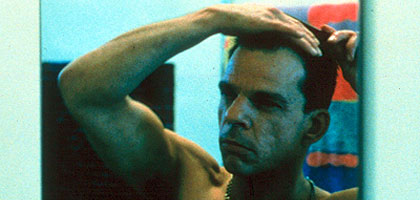
Beau Travail
France 1998

Reviewed by Charlotte O'Sullivan
Synopsis
Our synopses give away the plot in full, including surprise twists.
An ex-soldier, Galoup, looks back on his days in the Foreign Legion. Stationed in Africa, he enjoys a relationship with a local prostitute and relishes his role as second-in-command to handsome commandant Bruno Forestier. A young soldier, Gilles Sentain, arrives. Fearing his captain will be tempted by this beautiful boy, Galoup tries to tarnish Sentain's reputation. But when the youth rescues a drowning man, his popularity increases.
Galoup decides to take a group of the men, including Sentain, on a series of exercises away from the commandant. After a few days, he provokes Sentain by picking on one of the men. Sentain slaps him. Galoup now has grounds to dismiss him; Sentain goes off into the desert. On return to camp, Galoup faces a court martial and is expelled from the army. Sentain is later found by nomads. Galoup makes peace with himself.
Review
Claire Denis is good with bodies, and in this most spectacularly somnambulant of narratives they do a lot of work. As soon as we see the soldiers Sentain and Galoup, we know they are two forces which can only cancel each other out. Where Denis Lavant's Galoup has a face as rough as a lion's, Grégoire Colin's Sentain's is as smooth as a stone. Sentain's body tells us nothing about what he's thinking, while Galoup's blares out his sexual secrets. As a result, while we can empathise with Sentain, we never identify with him.
We first see Galoup's beloved captain Forestier in a black-and-white photograph. When this is replaced by the 'real' image of him smoking it's difficult to tell the difference - he still looks as mysterious as any noir hero. The same is true, too, of the men in the army and the prostitutes who service them: they're all gorgeous, iconic and remote.
What you realise, slowly, is that this is because they're all creatures of Galoup's memory. When, as a bitter civilian, Galoup presses an iron into his clothes, he looks stiff and ludicrous - a man doing a woman's job. But when the soldiers iron their clothes, they look fluid and complete. As they do their exercises, the camera crawls up their arms and thighs, asking us to breathe in their perfection. Like Galoup, we can't escape these visions of loveliness and begin to feel almost as oppressed by them. Are we and Galoup the aberrations, or are they? As the glowing landscape - yellow sand, green water, white rocks - pulsates behind the men's bodies, we enter into Galoup's masochistic, waking dream in which the answer, over again, seems to be that it's only the beautiful who belong.
Framing her essay on sexual identity like a thriller - "one stays and two are expelled," says Galoup of the trio he forms with Sentain and Forestier, prompting the question, which two? - Denis hooks our attention. Having allowed us to meet Forestier, she then has the screen fade to black, creating a sense of narrative expectation. The commandant's behaviour reveals flickers of nerves (unlike Sentain, he's self-conscious, given to gazing at himself in the mirror) which makes us wary of how he might treat the possessive Galoup. It's important that we don't sympathise with Galoup (or Sentain) too soon; looking for weak spots or the seeds of triumph in all three men, we see both, everywhere. Unable to judge these characters, we just have to stay with them.
The obvious dramatic models for Beau Travail's jealousy-fuelled narrative are Othello, Herman Melville's Billy Budd (Benjamin Britten's music for the opera based on Melville's novella dashes gloomy panic into our ears) and Greek tragedy. Denis clearly enjoys paying homage to other texts: Michel Subor's commandant is called Forestier, the name of the character the actor played in Jean-Luc Godard's Le Petit Soldat (1960). Like the soldiers who never engage in 'real' fighting, but merely prepare themselves, endlessly, the film feels like a dress rehearsal, full of props over-eager to simulate life.
The language in the film is excessively formal. Galoup's diary entries are entirely elegant (unlike the man). And it's as if he's supplying the words for everyone else, too. Thus a languid Forestier tells his men, "If it weren't for fornication and blood we wouldn't be here [in Africa]", while they themselves make clunky reference to the fact that Forestier is the "father" of their family unit. The language here is unnatural, stylised, but that's why it works. Galoup's jealousies are all about the body, but like a puppet master - or even a precious screenwriter - he seeks to control any jerky, commonplace impulses. The dialogue continually alerts us to this controlling desire, and its limitations.
What makes Beau Travail so special - and confounding - is that after all these clotted, self-defeating demonstrations of control, Galoup does find release. Early on, he tells himself that there's "freedom in remorse". It seems like just another sonorous try-out for genuine feeling, but towards the end we suddenly discover a new side to Galoup. He's in a disco, the anthemic club track 'The Rhythm of the Night' is playing and suddenly all the elements we've seen up to now - caged beast, clockwork toy, villain - blaze manically into life. With movements that are almost spasms, Lavant turns Galoup's body into something that takes up space rather than watches others encroach.
It's quite right that Sentain, Forestier and the prostitute should remain loose ends, untouched by reality. Perfect, saintly young boys may not really exist; prostitutes may not lead sleepy, ecstatic lives; captains may not stretch and tease in noir bubbles; but everyone except Galoup already knew that. It's also right that his sexuality should remain an unknown quantity - repression can't be undone in a day. What's important is that, while he may still be invisible to others (the disco is empty), Galoup can at last see himself and like what he sees - a glorious moment for him and for us.
Credits
- Director
- Claire Denis
- Producers
- Jérôme Minet
- Patrick Grandperret
- Screenplay
- Jean-Pol Fargeau
- Claire Denis
- Director of Photography
- Agnès Godard
- Editor
- Nelly Quettier
- Art Director
- Arnaud de Moléron
- Music
- Eran Tzur
- © La Sept ARTE/Tanais Com/SM Films
- Production Companies
- La Sept ARTE/Unités de Programmes Fiction/Pierre Chevalier present a co-production of La Sept ARTE/Tanais Com/SM Films with the participation of Centre National de la Cinématographie
